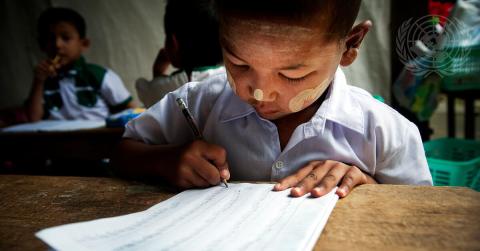More from UN DESA
Crisis in global learning: a call for action to improve education access, quality, equity and inclusion

Education is one of the best investments societies can make to build a more sustainable and prosperous future. Improvements in learning opportunities contribute directly to the achievement of sustainable development and the promotion of human rights, gender equality and the empowerment of women and girls. Realizing the right to education helps to eradicate poverty and makes individuals and communities more resilient in the face of natural disasters and climate change.
Nevertheless, progress towards achieving Sustainable Development Goal 4 (“Ensure inclusive and equitable quality education and promote lifelong learning opportunities for all”) is seriously off track. The education crisis we are witnessing today was exacerbated by the COVID-19 pandemic, with continuing devastating effects being felt by learners to this day.
At the end of 2019, more than half of children and young people in school were not meeting minimum proficiency standards in reading and numeracy. In 2021, 244 million children and youth were still out of school. The gender dimension of this crisis is particularly distressing. Nearly two thirds of the world’s non-literate adults are women, and girls are more likely than boys to remain excluded from primary and lower secondary education.
Governments need to take urgent action to prioritize investments in education, especially as the global school-age population between 6 and 11 years of age is expected to reach an all-time high of 820 million in 2023. It is important to provide increased support to teachers and educational personnel, to invest in educational infrastructure and in the recruitment, training and retention of qualified teachers, to scale up investments in science, technology, engineering and mathematics, and to redouble efforts for remedial, accelerated learning and catch-up strategies to mitigate learning losses.
Access to inclusive and equitable quality education, including digital literacy, is critical to ensure individuals and their societies can thrive in our rapidly changing world. Education promotes equal opportunities for young women and men to become integral contributors to decision-making processes and to participate in all spheres of life. Lifelong learning is a prerequisite for effective participation in our knowledge-dependent societies and economies and should be made available across the life course. Further, quality health education and literacy among young people remains essential for promoting sexual and reproductive health and protecting reproductive rights.
This World Population Day, learn more on this topic from the work by the Commission on Population and Development: http://voice.marketingbangkok.net/pd/events/CPD56
 Welcome to the United Nations
Welcome to the United Nations